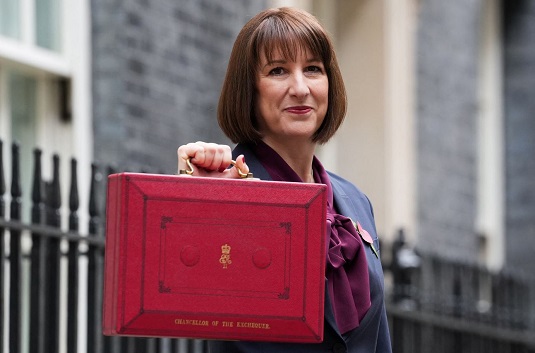
"This is not a budget we want to repeat", said Rachel Reeves of her Autumn statement this Wednesday afternoon, but if past behaviour is any indicator of future behaviour then she'll make similar choices again and again and again.
I won't wear anyone's patience by raking over the minutiae line by line. Yes, on balance this is a budget in which the most privileged will be coughing up a fraction of the huge gains they banked under the Tories. Hence the absurdity of the 'Comrade Reeves delights the workers and peasants with class war' headline on Conservative Home. This was nothing of the sort, but tallies with what was argued the other day about their hypersensitivity to any measures that strike at unearned income - the lynchpin of class relations. And so, the pips are squeaking as VAT goes on private school fees and business rate relief ends, huge duties are slapped on private jet passengers, capital gains tax goes up (but is still not equalised with income tax), non-dom status is scrapped, the minimum wage increases, and more will be scooped from inheritance and stamp duty.
And where will the money be spent? Commitments have been confirmed on sending HS2 to Euston, reversing the Tories politically motivated cuts. NHS and education spending will increase by 4.7%, a £1.3bn increase in council funding - but that would not meet the demand on adult social care and children's services alone. £12bn was also set aside for infected blood compensation, and £2bn for victims of the Post Office Horizon scandal. There's also a boost to the miners' pension scheme as the government has stopped taking its punitive share of the fund's surplus. And because there's always money for war, while some departments have to cut their cloth the MoD can look forward to an extra £3bn.
There has been some concern across the political spectrum about the increase in employers' National Insurance contributions, which will raise a projected £25bn. These worries echo the Office for Budgetary Responsibility's comment that this will mostly be passed on through lower wages and higher prices. Far be it for me to defend Reeves, but we know that Keir Starmer's programme is premised on a decade-long series of missions. Therefore, a lot of Reeves's decisions have to be considered in the longer view. Where the OBR's assessment of NICs is concerned, also relevant here is Reeves's minimum wage announcement. Following the Tories, she too has agreed to an above-inflation increase, amounting to approx £1,400/year boost from next April. In the context of the rest of the labour market and pay award structures among larger employers, this could ricochet up the pay structure, particularly for those on modest wages and salaries. More money goes into better paid workers' pockets, meaning more consumer spending, and the consequent multiplier effects eventually cover the NICs increase. This appears to be what the chancellor is banking on.
This was also a punitive budget for many on the sharpest end of the income scale. The bus fare increase stays. Even worse, Reeves confirmed she is keeping the last vindictive Tory attack on disabled people with her carrying through their plan (now her plan) to change the Work Capability Assessment so up to 450,000 stand to lose hundreds of pounds per month. There was more money released for supporting disabled people into work, but no recognition that not everyone can, and nothing about winding back the sanctions regime. As Disability Rights UK put it, "At the end of the day, the biggest announcement was one our community had been expecting: more Disabled and working-class people seeing their benefits cut whilst there will be no real difference in our local services."
This budget was high handed, overly technocratic (supported by a cynical framing), and gives with one hand while takes with another. It was Reeves, after all, who said over a decade ago that Labour didn't want to be the party of benefits, and so the preoccupation with authoritarian welfarism continues. There are elements of longer-term thinking here but not match with funding commitments adequate to the challenge. Her settlements do little to nothing to fix persistent social problems and a crumbling public infrastructure. In other words, because of its inadequacies and petty punishments Reeves's effort lies entirely within the envelope of her predecessors in Number 11. This was a Labour budget through and through.
Image Credit
No comments:
Post a Comment